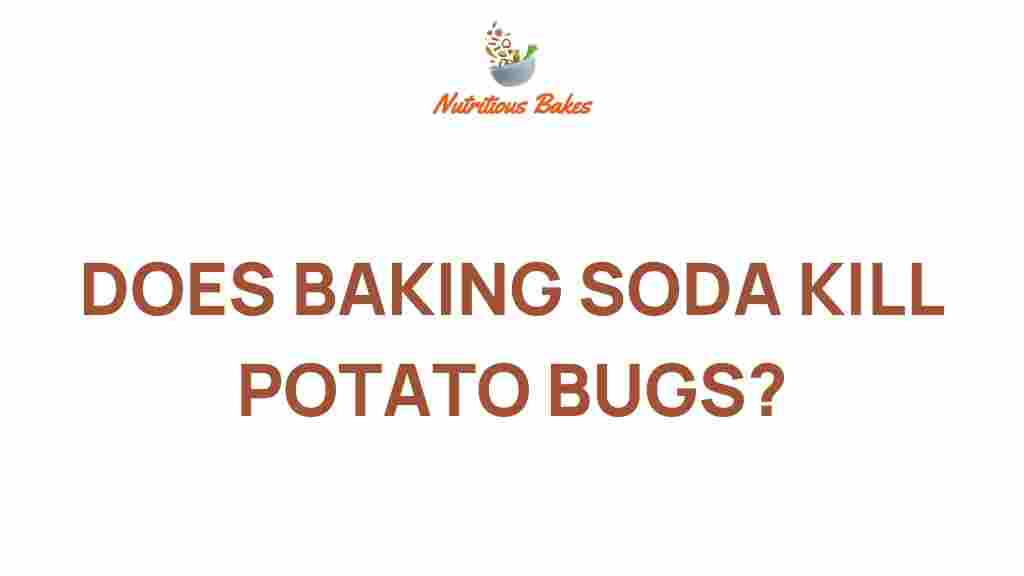Unveiling the Truth: Does Baking Soda Really Eliminate Potato Bugs?
When it comes to pest control in the garden, many gardeners are turning to natural remedies to protect their plants. One such remedy that has garnered attention is baking soda. Particularly for those dealing with the notorious potato bugs, the question arises: does baking soda really eliminate these pests? In this article, we will explore the effectiveness of baking soda against potato bugs, provide some gardening tips, and offer alternative effective solutions for plant protection.
Understanding Potato Bugs
Potato bugs, also known as Colorado potato beetles, are a common pest that affects potato plants as well as other members of the nightshade family, including tomatoes and eggplants. These pests can wreak havoc in your garden, as they not only feed on the leaves but can also lay eggs that hatch into even more beetles.
Recognizing potato bugs is crucial for effective pest control. Here are some identifying characteristics:
- Bright yellow or orange body with black stripes.
- Round shape, typically about 1/2 inch long.
- Larvae are often a reddish-orange color and can be found on the undersides of leaves.
Why Choose Organic Gardening?
Organic gardening focuses on maintaining a healthy ecosystem and minimizing the use of synthetic pesticides. This approach not only supports the environment but also promotes the health of the plants and the soil. Many gardeners are looking for natural remedies that are safe for their families and pets. Baking soda is one such ingredient that has been suggested for a variety of gardening purposes, including pest control.
How Does Baking Soda Work Against Potato Bugs?
Baking soda, or sodium bicarbonate, is a versatile substance that can be found in most kitchens. It has several properties that might make it effective against potato bugs:
- Desiccant Properties: Baking soda can dry out the exoskeleton of insects, ultimately leading to their demise.
- Alkaline Nature: The alkaline nature of baking soda can disrupt the digestive systems of many pests, including potato bugs.
- Fungicidal Properties: In addition to deterring pests, baking soda can also combat fungal diseases on plants.
Using Baking Soda as a Home Remedy
If you’re interested in trying baking soda as a solution for potato bugs, here’s a simple recipe:
Baking Soda Spray Recipe
- 1 tablespoon of baking soda
- 1 quart of water
- 1 teaspoon of dish soap (optional, for better adherence)
To prepare the spray:
- In a spray bottle, mix the baking soda and water.
- Add dish soap if using, and shake well to combine.
- Spray directly onto the potato bugs and affected leaves, ensuring thorough coverage.
Apply this solution in the early morning or late evening to avoid harming beneficial insects and to minimize evaporation.
Step-by-Step Application Process
To effectively use baking soda for potato bug control, follow these steps:
- Identify Infestation: Check your plants regularly for signs of potato bugs and their larvae.
- Prepare the Spray: Use the recipe mentioned above to create your baking soda solution.
- Apply the Spray: Spray the solution directly onto the potato bugs and the surrounding foliage.
- Repeat as Necessary: Reapply every few days until the infestation is under control.
Effectiveness of Baking Soda
While many gardeners swear by the effectiveness of baking soda against potato bugs, results can vary. It’s important to note that baking soda may not completely eliminate an infestation but can help manage it. For severe cases, consider integrating other home remedies or effective solutions for a comprehensive approach.
Alternative Natural Remedies for Potato Bug Control
If baking soda doesn’t yield the desired results, there are several other natural remedies you can explore:
- Neem Oil: Derived from the seeds of the neem tree, neem oil disrupts the life cycle of pests and can prevent them from feeding.
- Insecticidal Soap: A mixture of soap and water can suffocate potato bugs and their eggs.
- Garlic Spray: Garlic has natural insect-repelling properties. Blend garlic cloves with water, strain, and spray on affected plants.
- Companion Planting: Planting marigolds or basil near potatoes can deter potato bugs naturally.
Gardening Tips for Preventing Potato Bugs
Prevention is key when it comes to managing potato bugs. Here are some gardening tips to help keep these pests at bay:
- Crop Rotation: Change the location of your potato plants each year to disrupt the life cycle of the beetles.
- Regular Monitoring: Inspect your plants regularly for early signs of infestation.
- Healthy Soil: Maintain healthy soil through composting and organic fertilizers, promoting robust plant growth that can withstand pests.
- Handpicking: Manually remove potato bugs and larvae when spotted.
Troubleshooting Tips
If you find that baking soda or other natural remedies are not working as effectively as you’d like, consider these troubleshooting tips:
- Check Concentration: Ensure your baking soda solution is properly mixed; too weak may not be effective.
- Timing of Application: Apply during cooler parts of the day to enhance effectiveness and reduce evaporation.
- Combine Methods: Use a combination of methods for better results; for example, using baking soda alongside neem oil.
Conclusion
In conclusion, baking soda can be a useful tool in the fight against potato bugs, particularly when used as part of a broader organic gardening strategy. While it may not be a magic bullet, it offers a safe, low-cost alternative to synthetic pesticides. Remember to monitor your plants regularly and explore various natural remedies for pest control. With persistence and the right techniques, you can protect your garden from potato bugs and enjoy a bountiful harvest.
For further reading on gardening strategies and pest management, check out this comprehensive guide on organic gardening techniques. For more details on baking soda’s uses, visit home remedy resources.
This article is in the category Tips and created by NutritiousBakes Team
